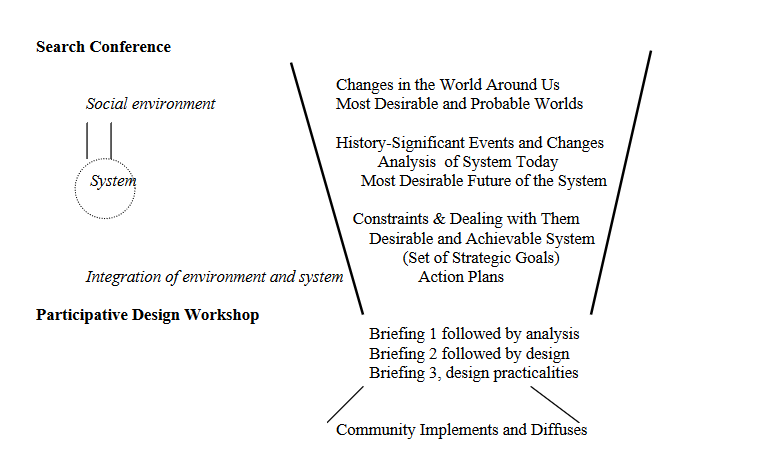All organisations and communities today need to periodically take stock of themselves in their rapidly changing environments and plan more adaptive directions and futures. In highly uncertain environments, business leaders must be able to answer: ‘Where do we want to be in year X within the context of this uncertainty?’
The Search Conference (SC) is a proven strategic planning process for organisations and communities operating in turbulent and uncertain environments. It is a participative strategic planning process developed by eminent Australian social systems scientist, the late Professor Fred Emery. Since its development, Fred and his partner Dr Merrelyn Emery conducted further in-depth action research to improve the effectiveness of the SC.
Today the SC is a proven process for reliable and effective strategic planning that can be used by any organisation, community, national or international group to address their future or the future of an issue such as Australia’s marginal lands. It has the power to produce cohesive, cooperative management and community groups who become, and stay committed to making their futures. By partaking in a SC, participants are not only committed to making their own futures, but they also learn about the SC process itself so that they can continue to adaptively change.
For organisations attempting to adapt to highly unpredictable environments caused by unstable value systems and amplified by factors such as the accelerating uptake of AI, work from home and digital platform technologies, they are all too often running from one new change management fad to the next. However, applying the SC affords greater control of their destinies.
By undertaking an organisational SC, management can:
- Develop a strategic framework within which other improvement strategies such as benchmarking, value adding partnerships, etc can be integrated and aligned with overall strategic objectives
- Explore changing market and industry conditions so that the plan developed reflects, and is responsive to, the changing environment
- Plan their future as a cohesive unit
- Maintain commitment to implementing their future plans by designing and organising themselves into cooperative and responsive self-managing groups
Organisations and communities as ‘Open Systems’
Organisations and communities are defined as ‘Open Systems’ because they are ‘open’ to their external environments. That is, they influence and change their environments over time, while at the same time being influenced by external changes in the environment.
Organisations or communities, as an ‘Open System’, will through its actions over time change its external environments, which in turn will change it. This means that the they must have an open and actively adaptive relationship with its environments over time to ensure viability. In other words, a healthy ‘Open System’ has a direct correlation over time with the external environment.
To design a successful SC requires an understanding of the nature of relationships within and between an ‘Open System’ and its ‘Environments’. This understanding has led to the development of Open Systems Theory, which is a socio-ecological (people-in-system-in-environment) body of knowledge that is being successfully utilised by many communities and organisations, including corporate giants such as Microsoft and Hewlett Packard.
The environments for organisations are the Industry or Task Environment and an outer layer known as the ‘Extended Social Field’ or the world around us. The ‘Organisation as System’ and its ‘Environments’ are depicted in the Diagram 1.

Search conference is participative 2.5 day, facilitated method for strategic planning with a proven set of steps tested over 50years of development,
practice and theory. Participants of the search are those responsible for the health and direction of the organisation and those responsible for the implementation of the strategy. It is suggested to be run for a cohort of 20-40 people.
Search Conference is part 1 of a two stage model for Open Systems Theory that can be followed by a Participative Design Workshop.

